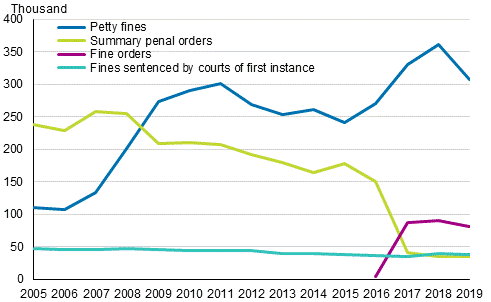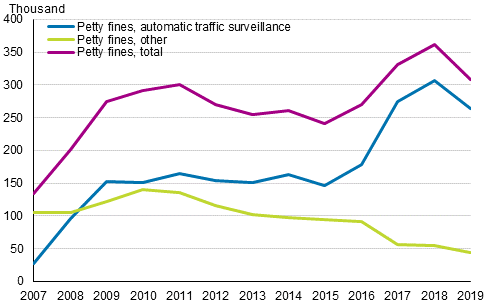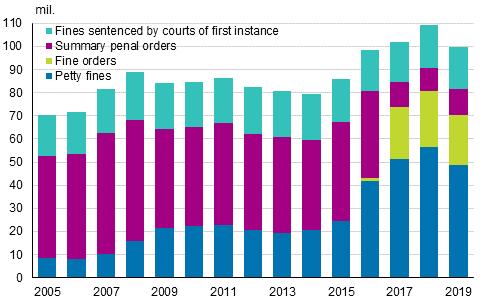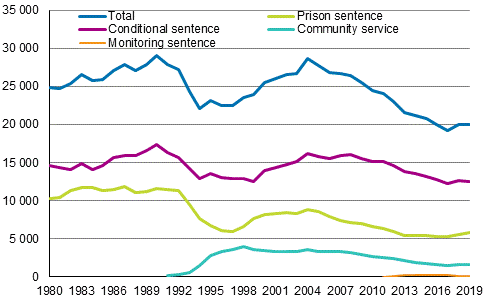Published: 24 September 2020
Number of fines went down by 12 per cent
According to Statistics Finland's data, 12 per cent fewer fines were imposed in 2019 than one year earlier. The number of petty fines went down by 15 per cent and that of fine orders by 11 per cent. In all, 37,676 fines were imposed by courts of first instance, which is four per cent fewer than one year previously. Slightly more summary penal orders by prosecutors were issued than in 2018.
Development of fines sentenced by courts of first instance, summary penal orders and fine orders and petty fines in 2005 to 2019, number

In 2019, altogether around 307,622 petty fines were imposed. Of them, 86 per cent were a result of camera surveillance. The number of petty fines issued on the basis of camera surveillance was 14 per cent lower than in 2018. Around one half of the petty fines imposed in 2019 amounted to EUR 170 and slightly over one quarter to EUR 140. The vast majority of the petty fines, 95 per cent, were results of traffic infractions. In 2019, altogether 15 per cent fewer petty fines were issued for traffic infractions than one year earlier.
Petty fines 2007-2019, number

In 2019, the police issued a fine order 81,178 times, which was almost 10,000 fine orders fewer than one year earlier. Fifty-four per cent of fine orders were caused by endangerment of traffic safety, 28 per cent by traffic infractions and 13 per cent by petty thefts. Fines imposed by district courts also decreased slightly compared with 2018. In 2019, a total of 37,676 day fines were issued (incl. fines and petty fines sentenced in court, supplementary day fines and disciplinary fines), which is nearly four per cent fewer than one year previously. Fourteen per cent of day fines imposed by district courts were caused by drunken driving, 11 per cent by aggravated drunken driving, 14 per cent by petty thefts and nine per cent by assaults. Of the fines caused by aggravated drunken driving, 98 per cent were supplementary day fines imposed in addition to conditional imprisonment.
The accrual of all fines (incl. fines and petty fines sentenced in court, supplementary day fines and disciplinary fines) was in total over EUR 99.8 million in 2019, nearly nine per cent lower than a year before. Petty fines were imposed to the amount of EUR 48.6 million, which was 14 per cent lower than in 2018. The accrual of fine orders, EUR 21.9 million, decreased by 10 per cent from 2018. The accrual of fines for summary penal orders (EUR 11 million) grew by 13 per cent from 2018. A total of EUR 18.3 million in fines were issued in courts of first instance, which was almost the same as one year before.
Total accrual of fines for fines sentenced by courts of first instance, summary penal orders and fine orders and petty fines in 2005 to 2019, EUR

Nearly five per cent more unconditional imprisonment sentences were passed
Altogether 5,840 unconditional imprisonment sentences were passed in 2019, five per cent more than one year earlier. Twenty of these were sentences of life imprisonment and 542 were sentences where previous unconditional imprisonment was regarded as a sufficient sanction. Seventy-three sentences of fixed-term unconditional imprisonment of eight years or longer were passed. Sixty per cent of them were sentences for manslaughter, murder, killing or infanticide and 34 per cent for narcotics offences. Forty-three per cent of all unconditional imprisonment sentences were for under three months. Of them, 47 per cent were results of traffic offences, 30 per cent of property offences and nine per cent of offences against life and health. The average unconditional imprisonment was 11.1 months in duration.
A new sentence, especially intended for recidivists of serious offences, the combination sentence, was introduced in 2018. It consists of unconditional imprisonment and a supervision term of one year after imprisonment. In 2019, four persons were sentenced to a combination sentence.
Altogether 12,485 sentences of conditional imprisonment were passed in 2019, nearly two per cent fewer than one year earlier. The duration of conditional imprisonment was 4.2 months, on average. Around 34 per cent of sentences of conditional imprisonment were caused by aggravated drunken driving. The second most sentences of conditional imprisonment were passed for assaults.
Unconditional imprisonment of at most six months can be passed as a monitoring sentence. In 2019, a total of 156 unconditional imprisonment sentences were converted into monitoring sentences and they had the average duration of three months.
Unconditional imprisonment of under eight months can be sentenced as community service if it is not caused by refusing military or civil military service or a civil military service offence. Twenty-nine per cent of all convertible unconditional imprisonment sentences were converted into community service in 2019. Community service was clearly used most when passing a sentence for aggravated drunken driving. The average duration of community service was 100 hours.
Imprisonment in 1980 to 2019, number

Source: Prosecutions, sentences and punishments 2019, Statistics Finland
Inquiries: Salla Tuominiemi 029 5513 691, rikos@stat.fi
Head of Department in charge: Hannele Orjala
Updated 24.9.2020
Official Statistics of Finland (OSF):
Prosecutions, sentences and punishments [e-publication].
ISSN=2343-1679. 2019. Helsinki: Statistics Finland [referred: 2.3.2026].
Access method: http://stat.fi/til/syyttr/2019/syyttr_2019_2020-09-24_tie_001_en.html

